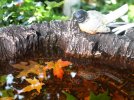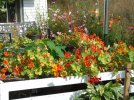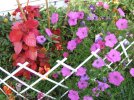LEGION 12
Gold Member
- Joined
- Jan 8, 2009
- Messages
- 59,419
Unfortunately my peas seem to have some kind of fungus just when they started to get pods .I yanked the two tomato plants from my containers (Goliath variety) over the weekend, churned up the soil, added some slow release granular fertilizer, and added some more potting soil to nearly the brim. Think I'm going to stick some Pansies in those two containers for the winter/spring to be replaced by new tomato plants next year.
I still have one Big Boy variety tomato plant in the garden with a fair number of green tomatoes on it.
Last evening after dark I noticed a Hummingbird Moth laying eggs on my two remaining tomato plants I planted in July. So, I can expect to see some hornworms in a bit.
One of my celery plants is acting like someone sprayed weed killer on it with the leaves starting to roll a bit. Probably will loose that plant.
Still pretty dry here. I need to aerate my yard and over seed, but I have been dragging my feet on that because I will have to water so much to get the new seed going. Mother nature is not helping much in the precipitation department over the last few months. I made a spread sheet summarizing all of the rainfall this year so far (by month & day). (I was already doing a monthly total on another spreadsheet. The thing that jumps out at you is how dry it has gotten over the last few months and the frequency of rain has decreased. The time gaps between rains has gotten much wider. I previously just wrote the measurements down on a calendar, but there is other stuff written on the calendar and the rain issue doesn't stand out now.
I got the more precise rain gauge a couple years ago because of a drought that was ongoing at the time and I wanted to see better how much rain we were actually getting at the house. This was during the time period when Gatlinburg TN (Smoky Mt NP) was getting the wild fire. That was a survival event for many people living on the outskirts of Gatlinburg.
LEGION 12 Have you gotten any peas from your late planting? I never have tried to plant peas late in the year.








